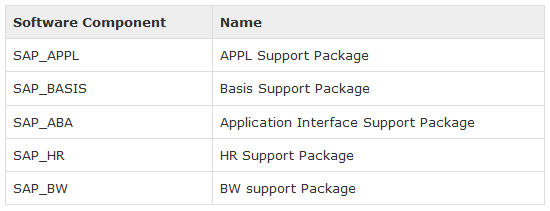Basis
is a set of programs and tools that act as an interface with Database,
Operating system, Communication protocols and business applications (such as
FI, CO, MM, etc). Full form of BASIS is "Business Application Software
Integrated solution". Learn SAP BASIS training from SAP certified professionals by SAP Trainings Online.
In
SAP system, a patch is used to fix a bug. There are different types of patches
that can be used in SAP system. All patches start with SAPK followed by patch
type.
The
following are the four different types of patches:
- ABAP (SAPKA620XXXX)
- BASIS (SAPKB620XXXX)
- HR (SAPKE470XXXX)
- APPLICATIONS (SAPKH470XXXX)
SMP
provides correction in form of patches. It may contain corrections similar to
SAP notes, ABAP programming (Learn ABAP programming from SAP ABAP training by experts from SAP Trainings Online). It
helps to avoid Runtime error and dumps. You can check logs at SPAM. Sometime
leaving the TR unreleased caused the issue or some manual correction is
required.
In
that case we cannot apply sap notes (even if we find them at OSS) as we are
stuck in SPAM error phase. Also in backend user\sap\trans\log and temp
file contains the logs for error.
A
patch follows this structure — SAPKA <Rel><No>
Patches
are also called support packs and they should be applied in the following
sequence:
- BASIS (SAPKB620XXXX)
- ABAP (SAPKA620XXXX)
- HR (SAPKE470XXXX)
- APPLICATIONS (SAPKH470XXXX)
Support packages and add-ons
As
the name suggests, support packages are used to fix the bug and to improve the
quality of SAP system. Support package implementation and administration is
done with Transaction Spam (Support Package Manager). Each support package is
valid for one release and Support Package Manager ensures that all support
packages are applied in a specified order.
Support
packs are applied in the above mentioned order — Basis > ABAP > HR >
Applications. It is not necessary that Basis and ABAP patch levels should be
same but SAP recommends that they should be at the same level. Generally, Basis
and ABAP should be applied together however to apply one first, it should be
Basis.
All
support packs are applied with client 000. Support packages should be imported
at regular intervals to avoid errors and to keep system landscape up to date.
There
are different types of support packages available:
SPAM
Update − A SPAM Update contains updates and improvements to Support Package
Manager (SPAM) and Add-On Installation Tool.
Component
Support Package − This contains improvement for one software component such
as SAP Basis, SAP HR or SAP APPLICATIONS and to update repository and
dictionary objects.
The
following table shows some naming conventions for Support Packages:
Conflict
Resolution Transport − This is used to adjust the support packages on add
on. A CRT for one release also contains adjustment for earlier releases of this
add-on.
Requirements to implement support package
A
support package is always implemented on client 000 and user should have an
authorization equivalent to DDIC or SAP.
To
implement a support package, use transaction code — SPAM. You can check if any
previous package is in progress or is incomplete. If there is an incomplete
support package, you can’t proceed with the implementation of a new one.
About SAP BASIS Online Training
SAP
Trainings Online is a deceptively simple e-learning and SAP training authoring solution. Create super-effective training
content and deliver courses via Virtual and implant in existing systems. It
is very important for BASIS consultant to have hands on experience on live
servers. It is right to have training because every scenario could not be
created just by installing SAP. We provide training in many countries India,
USA, UK, Canada, Australia, and New Zealand.
Register
with us for free demo: www.saptrainingsonline.com/student-registration
For more
details visit: www.saptrainingsonline.com
Email: contact@saptrainingsonline.com
Contact: India +91 9052775398 USA +1315282580






No comments:
Post a Comment